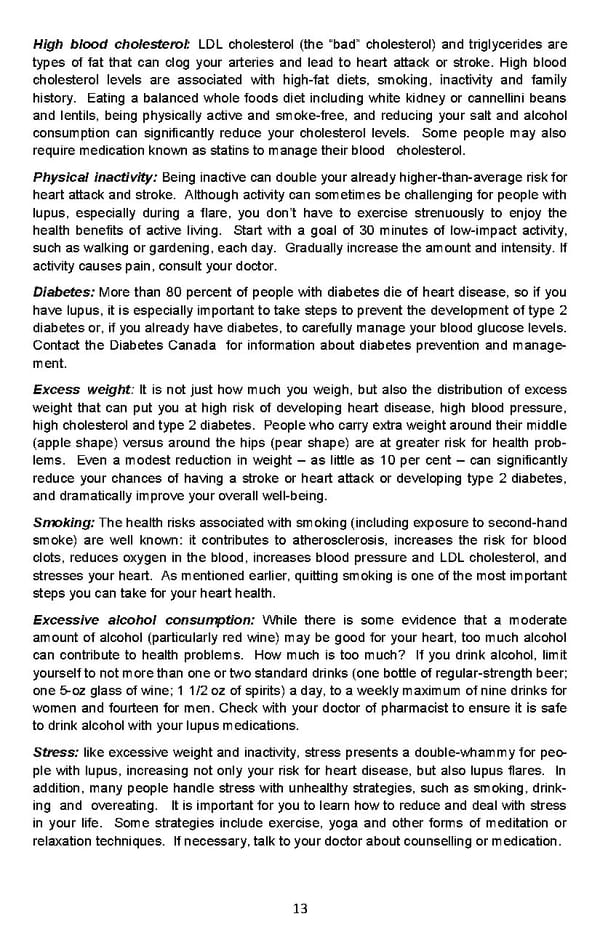High blood cholesterol: LDL cholesterol (the “bad” cholesterol) and triglycerides are types of fat that can clog your arteries and lead to heart attack or stroke. High blood cholesterol levels are associated with high-fat diets, smoking, inactivity and family history. Eating a balanced whole foods diet including white kidney or cannellini beans and lentils, being physically active and smoke-free, and reducing your salt and alcohol consumption can significantly reduce your cholesterol levels. Some people may also require medication known as statins to manage their blood cholesterol. Physical inactivity: Being inactive can double your already higher-than-average risk for heart attack and stroke. Although activity can sometimes be challenging for people with lupus, especially during a flare, you don’t have to exercise strenuously to enjoy the health benefits of active living. Start with a goal of 30 minutes of low-impact activity, such as walking or gardening, each day. Gradually increase the amount and intensity. If activity causes pain, consult your doctor. Diabetes: More than 80 percent of people with diabetes die of heart disease, so if you have lupus, it is especially important to take steps to prevent the development of type 2 diabetes or, if you already have diabetes, to carefully manage your blood glucose levels. Contact the Diabetes Canada for information about diabetes prevention and manage- ment. Excess weight: It is not just how much you weigh, but also the distribution of excess weight that can put you at high risk of developing heart disease, high blood pressure, high cholesterol and type 2 diabetes. People who carry extra weight around their middle (apple shape) versus around the hips (pear shape) are at greater risk for health prob- lems. Even a modest reduction in weight – as little as 10 per cent – can significantly reduce your chances of having a stroke or heart attack or developing type 2 diabetes, and dramatically improve your overall well-being. Smoking: The health risks associated with smoking (including exposure to second-hand smoke) are well known: it contributes to atherosclerosis, increases the risk for blood clots, reduces oxygen in the blood, increases blood pressure and LDL cholesterol, and stresses your heart. As mentioned earlier, quitting smoking is one of the most important steps you can take for your heart health. Excessive alcohol consumption: While there is some evidence that a moderate amount of alcohol (particularly red wine) may be good for your heart, too much alcohol can contribute to health problems. How much is too much? If you drink alcohol, limit yourself to not more than one or two standard drinks (one bottle of regular-strength beer; one 5-oz glass of wine; 1 1/2 oz of spirits) a day, to a weekly maximum of nine drinks for women and fourteen for men. Check with your doctor of pharmacist to ensure it is safe to drink alcohol with your lupus medications. Stress: like excessive weight and inactivity, stress presents a double-whammy for peo- ple with lupus, increasing not only your risk for heart disease, but also lupus flares. In addition, many people handle stress with unhealthy strategies, such as smoking, drink- ing and overeating. It is important for you to learn how to reduce and deal with stress in your life. Some strategies include exercise, yoga and other forms of meditation or relaxation techniques. If necessary, talk to your doctor about counselling or medication. 13
 Living Well With Lupus Facts Booklet Page 12 Page 14
Living Well With Lupus Facts Booklet Page 12 Page 14